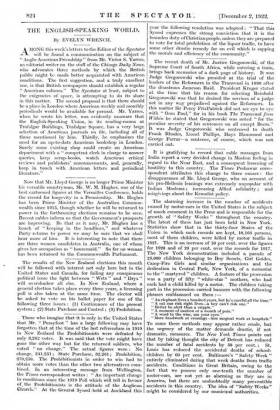The alarming increase in the number of accidents caused by
motor-cars in the United States is the subject of much comment in the Press and is responsible for the growth of "Safety Weeks" throughout the country. The latest of these has just been held in New York. Statistics show that in the thirty-four States of the Union in which such records are kept, 10,163 persons, most of them children, were killed by motor traffic in 1921. This is an increase of 10 per cent, over the figures for 1920 and of 28 per cent, over the records for 1917. The New York demonstration included a parade of 25,000 children belonging to Boy Scouts, Girl Guides, Camp-Fire Girls and similar organizations and the dedication in Central Park, New York, of a memorial to the" martyred" children. A feature of the procession was a party of fifty " white-star " mothers, who had each had a child killed by a motor. The children taking part in the procession carried banners with the following phrases emblazoned on them :— " An elephant lives a hundred years, but he's careful all the time." "A cat can risk eight lives—a boy can't risk one."
"Better be alert than a cripple." "A moment of caution or a month of pain." "A word to the wise, use your eyes." . "More headwork at crossings—less surgical work at hospitals."
To some these methods may appear rather crude, but the urgency of the matter demands drastic, if not dramatic, measures. The New York Times points out that by taking thought the city of Detroit has reduced the number of fatal accidents by 50 per cent. ; St. Louis has reduced the accidental deaths of school- children by by 60 per cent. Baltimore's "Safety Week" entirely eliminated during that week deaths from traffic accidents. Conditions in Great Britain, owing to the fact that we possess only one-tenth the number of motor-cars, are not yet as alarming as they are in America, but there are undoubtedly many preventible accidents in-this country. The idea of "Safety Weeks" might be considered by our municipal authorities.






































































 Previous page
Previous page